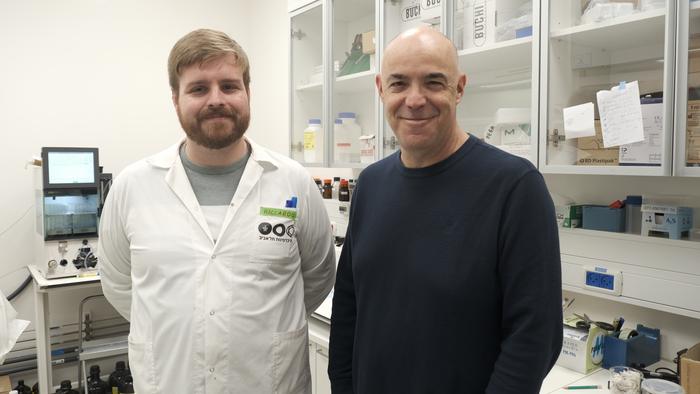
In a revolutionary advancement in the field of biomedicine, researchers at Tel Aviv University have made significant strides in targeted drug delivery mechanisms, particularly in the realm of inflammatory diseases. The team’s innovative approach utilizes lipid nanoparticles to transport messenger RNA (mRNA) directly to the immune system of the intestines, effectively avoiding the liver during systemic administration. This novel technique has the potential to reshape the treatment landscape for conditions such as Crohn’s disease and colitis.
Traditionally, administering drugs through the bloodstream resulted in them predominantly being processed by the liver, often leading to unwanted side effects and reduced therapeutic efficacy. The breakthrough presented by Dr. Riccardo Rampado and his team, including the visionary Prof. Dan Peer, addresses these limitations by allowing for the direct delivery of mRNA-based therapeutics to specific areas where they are needed most. By modifying the composition of the lipid nanoparticles, they have demonstrated that it is possible to guide the mRNA directly to the targeted cells in the intestines, thereby minimizing systemic exposure and potential toxicity to the liver.
One of the major challenges in drug delivery has been the fact that nearly all substances introduced into the bloodstream end up in the liver. As noted by Prof. Peer, this poses two significant hurdles: the risk of liver toxicity from drugs meant for other tissues and the need to ensure that those drugs do not become trapped in the liver. The researchers discovered that by adjusting the lipid composition of the nanoparticles, they could influence their trajectory in the bloodstream, effectively dictating where the drugs would accumulate.
In their study, the team encapsulated the anti-inflammatory protein interleukin-10 into mRNA within lipid nanoparticles specifically designed for this purpose. Rather than using conventional formulations typically used in mRNA vaccines, they created a customized composition that significantly improved delivery efficiency to the intestines. This method allowed researchers to tackle inflammatory diseases directly within the digestive tract, providing a powerful new avenue for therapeutic intervention.
The implications of this research are profound. By not only delivering mRNA encoding an anti-inflammatory agent but also converting the immune cells in the intestines into factories that produce interleukin-10, the study showcases the potential for self-sustaining treatments for chronic inflammatory conditions. While this proof-of-concept work represents a significant leap forward, it also opens the door to further exploration of how varying the nanoparticle composition might allow for the delivery of a broader spectrum of RNA-based medications to diverse organs within the body.
Delving deeper into the science, lipid nanoparticles function by mimicking biological membranes, allowing them to traverse cellular barriers more effectively. In the context of this research, the team increased the ratio of phosphatidylcholine, a critical phospholipid component found in cell membranes, from the typical 10% used in vaccines to 30%. This adjustment was pivotal; it resulted in the nanoparticles exhibiting unique behavior in the bloodstream, akin to oil floating on water. Such behavior is crucial for targeting the nanoparticles to specific tissues, allowing for unprecedented precision in drug delivery.
Prof. Peer further elaborated on the significance of this lipid composition modification, explaining that it has a scientific basis rather than being a mere trial-and-error approach. The chosen ratio closely resembles the natural biological membranes of intestinal cells, enhancing the likelihood of successful uptake and therapeutic action. This understanding positions the research as not only a milestone in drug delivery but also as a potential template for future innovations aimed at refined therapeutic strategies.
The possibilities this research unlocks for the treatment of not only inflammatory bowel diseases but also other medical conditions are vast. The adaptability of the nanoparticle formulation could lead to targeted therapies for organs beyond the intestines, such as the pancreas, or even the brain, which have historically proven difficult to reach with conventional treatments. The researchers plan to explore these options as they continue to push the boundaries of what’s possible in drug delivery systems.
As this research gains recognition, it highlights the importance of interdisciplinary collaboration in advancing the frontiers of medicine. The expertise of the Tel Aviv University team, combining elements of biochemistry, materials science, and pharmacology, has led to innovative breakthroughs that could alter the course of treatment for millions suffering from chronic diseases. The translation of these scientific advancements into clinical practice will hinge on further studies, but the initial results are promising and indicative of a new era in targeted drug delivery.
Furthermore, the implications extend beyond just the immediate treatment of gastrointestinal disorders; this work signifies a paradigm shift toward more personalized, effective therapies that can be tailored to individual patient needs. By mitigating off-target effects and leveraging the body’s natural capabilities, the scientific community is one step closer to integrating advanced RNA-based therapies into mainstream medical practice.
In conclusion, the groundbreaking work emerging from Tel Aviv University illustrates the transformative potential of lipid nanoparticle technology in drug delivery systems. By harnessing the power of mRNA and precision targeting, researchers are paving the way for more effective treatments for some of the most challenging health conditions faced today. As they continue to refine this technology, the prospect of achieving better patient outcomes through innovative therapies becomes increasingly tangible.
Subject of Research: Targeted drug delivery using lipid nanoparticles for mRNA therapeutics
Article Title: Breakthrough in Targeted Drug Delivery: Tel Aviv University Researchers Successfully Transport mRNA to the Intestines
News Publication Date: October 2023
Web References: Advanced Science Journal
References: Advanced Science
Image Credits: Tel Aviv University
Keywords: lipid nanoparticles, drug delivery, inflammatory diseases, mRNA therapeutics, interleukin-10, targeted therapy, Crohn’s disease, colitis, phosphatidylcholine, medical research, Tel Aviv University, Prof. Dan Peer
Tags: advancements in mRNA therapeuticsbypassing liver in drug administrationcolitis targeted therapiesCrohn’s disease mRNA therapyinnovative biomedicine breakthroughsintestinal immune system targetinglipid nanoparticles for drug deliveryminimizing liver toxicity in drug deliverysystemic administration challengestargeted delivery of mRNA drugsTel Aviv University drug researchtreatment for inflammatory diseases





